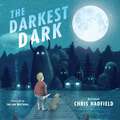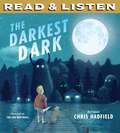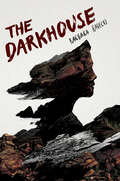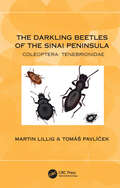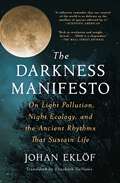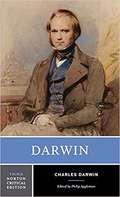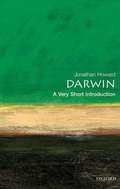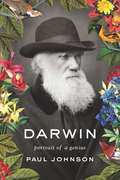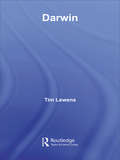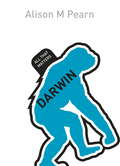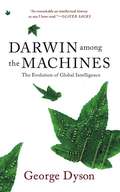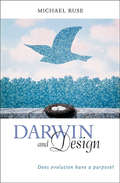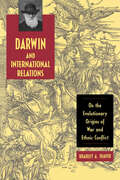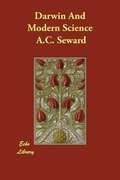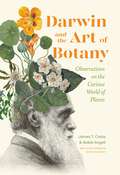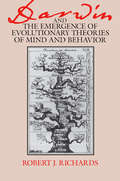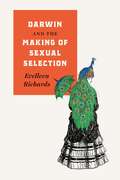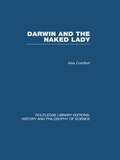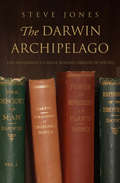- Table View
- List View
The Darkest Dark
by Chris Hadfield Kate FillionInspired by the childhood of real-life astronaut Chris Hadfield and brought to life by Terry and Eric Fan's lush, evocative illustrations, The Darkest Dark will encourage readers to dream the impossible. Chris loves rockets and planets and pretending he's a brave astronaut, exploring the universe. Only one problem--at night, Chris doesn't feel so brave. He's afraid of the dark. But when he watches the groundbreaking moon landing on TV, he realizes that space is the darkest dark there is--and the dark is beautiful and exciting, especially when you have big dreams to keep you company.
The Darkest Dark: Read & Listen Edition
by Chris Hadfield Kate FillionInspired by the childhood of real-life astronaut Chris Hadfield and brought to life by Terry and Eric Fan's lush, evocative illustrations, The Darkest Dark will encourage readers to dream the impossible. Chris loves rockets and planets and pretending he's a brave astronaut, exploring the universe. Only one problem--at night, Chris doesn't feel so brave. He's afraid of the dark. But when he watches the groundbreaking moon landing on TV, he realizes that space is the darkest dark there is--and the dark is beautiful and exciting, especially when you have big dreams to keep you company.
The Darkhouse
by Barbara RadeckiFifteen-year-old Gemma’s life on a small New Brunswick island with her father, Jonah, is not an exciting one. Her mother ran off when she was an infant, and Jonah, an amateur scientist, spends most of his time conducting experiments he thinks will one day bring him fame. But when a woman arrives on the island, Gemma tries to play matchmaker – only to discover Jonah’s hidden journals, which hold terrifying secrets about both their lives. Mystery, science, and dreams of a better life collide in this page-turning young adult novel from Barbara Radecki.
The Darkling Beetles of the Sinai Peninsula: Coleoptera: Tenebrionidae
by Martin Lillig Tomáš PavlíčekAn expanded and updated edition of the out-of-print 2003 supplementum of Zoology in the Middle East, this concise guide to Darkling Beetles of the Sinai Peninsula has been sought after by researchers in taxonomy, faunistics and biogeography. The new book includes two additional subfamilies of tenebrionid beetles (4-5 species), identification keys and more than 90 colour photographs and species distribution maps. Zoogeographically speaking, the Sinai Peninsula is a crossroad and, at the same time, a center of speciation. Despite its generally arid character, the region harbours a wide range of habitats, from sea level to over 2,500 m above. About 10 percent of the Sinai darkling beetles are endemic to the area. The inclusion of species photographs and identification keys makes this book an invaluable reference field guide, for both specialists and non-specialists, who will thus be able to discover the taxonomic and phylogenetic diversity of darkling beetles in the Sinai Peninsula.
The Darkness Manifesto: On Light Pollution, Night Ecology, and the Ancient Rhythms that Sustain Life
by Johan EklöfIn the bestselling tradition of Why We Sleep and The Sixth Extinction, an urgent and insightful look at the hidden impact of light pollution, and a passionate appeal to cherish natural darkness for the sake of the environment, our own well-being, and all life on earth.How much light is too much light? Satellite pictures show our planet as a brightly glowing orb, and in our era of constant illumination, light pollution has become a major issue. The world&’s flora and fauna have evolved to operate in the natural cycle of day and night. But in the last 150 years, we have extended our day—and in doing so have forced out the inhabitants of the night and disrupted the circadian rhythms necessary to sustain all living things, including ourselves. In this persuasive, well-researched book, Swedish conservationist Johan Eklöf urges us to appreciate natural darkness, its creatures, and its unique benefits. Eklöf ponders the beauties of the night sky, traces the errant paths of light-drunk moths and the swift dives of keen-eyed owls, and shows us the bioluminescent creatures of the deepest oceans. As a devoted friend of the night, he writes passionately about the startling damage we inflict on ourselves and our fellow creatures simply by keeping the lights on. The Darkness Manifesto depicts the domino effect of diminishing darkness: insects, dumbfounded by streetlamps, failing to reproduce; birds blinded and bewildered by artificial lights; and bats starving as they wait in vain for food insects that only come out in the dark of night. For humans, light-induced sleep disturbances impact our hormones and weight, and can contribute to mental health problems like chronic stress and depression. The streetlamps, floodlights, and neon signs of cities are altering entire ecosystems, and scientists are only just beginning to understand the long-term effects. The light bulb—long the symbol of progress and development—needs to be turned off. Educational, eye-opening, and ultimately encouraging, The Darkness Manifesto outlines simple steps that we can take to benefit ourselves and the planet. In order to ensure a bright future, we must embrace the darkness.
Darmgesundheit und Mikrobiota: Ein Überblick über die Bedeutung der Darmbakterien für die Gesundheit (essentials)
by Dirk Haller Gabriele HörmannspergerDirk Haller und Gabriele Hörmannsperger geben einen Überblick über die zentrale Rolle des Darms und seiner Bewohner für die Gesundheit und vermitteln zusätzlich einen ersten Eindruck von den komplexen und dynamischen Interaktionen zwischen D+armbakterien und Wirt. Denn Forschungsergebnisse der letzten Jahre weisen darauf hin, dass die lange unbeachteten Darmbakterien (intestinale Mikrobiota) eine unerwartet zentrale Rolle für die Aufrechterhaltung der Gesundheit einnehmen. Die Forschung beschäftigt sich aktuell intensiv damit, die Grundlagen für ein funktionierendes und gesundheitsförderndes mikrobielles Ökosystem zu identifizieren. Dieses Wissen kann zukünftig für die Entwicklung gezielter Maßnahmen zur Prävention und Therapie Mikrobiota-assoziierter Erkrankungen eingesetzt werden.
Darwin: Norton Critical Editions
by Philip Appleman<p>The impact of Charles Darwin’s work on Western civilization has been broad and deep. As much as anyone in the modern era, he changed human thought, and his influence is still felt in virtually all aspects of our lives. This new edition, larger and more varied than the previous ones, includes more of Darwin's own work and also presents the most recent research and scholarship on all aspects of Darwin’s legacy. The biological sciences, as well as social thought, philosophy, ethics, religion, and literature, have all been shaped and reshaped by evolutionary concepts. <p>Excerpts from the most important books and articles of recent years confirm this Darwinian heritage. New work by Richard Dawkins, Edward O. Wilson, Kevin Padian, Eugene C. Scott, Steven Pinker, Daniel Dennett, Michael Ruse, Frans de Waal, Noretta Koertge, George C. Williams, George Levine, Stephen Jay Gould, Gillian Beer, Ernst Mayr, and many others illuminates this exciting intellectual history. A wide-ranging new introduction by the editor provides context and coherence to this rich body of engaging material, much of which will be shaping human thought well into the new century.</p>
Darwin: A Very Short Introduction
by Jonathan HowardDarwin's theory that man's ancestors were apes caused an uproar within the scientific world, as well as public frenzy when The Origin of Species was published in 1859. Arguments still rage about the implications of his evolutionary theory, and skepticism about the value of Darwin's contribution to knowledge is widespread. In this analysis of Darwin's major insights and arguments, Jonathan Howard reasserts the importance of Darwin's work for the development of modern biology. He offers a stimulating view of the famous scientist in a concise, handy format, making it a masterpiece for all Darwinians as well as for all general readers of popular science.
Darwin: portrait of a genius
by Paul JohnsonEminent historian Paul Johnson provides a rich, succinct portrait of Charles Darwin Charles Darwin is arguably the most influential scientist of all time. His Origin of Species forever changed our concept of the world’s creation. Darwin’s revolutionary career is the perfect vehicle for historian Paul Johnson. Marked by the insightful observation, spectacular wit, and highly readable prose for which Johnson is so well regarded, Darwin brings the gentleman-scientist and his times brilliantly into focus. From Darwin’s birth into great fortune to his voyage aboard the Beagle, to the long-delayed publication of his masterpiece, Johnson delves into what made this Victorian gentleman into a visionary scientist—and into the tragic flaws that later led Darwin to support the burgeoning eugenics movement. Johnson’s many admirers as well as history and science buffs will be grateful for this superb account of Darwin and the everlasting impact of his discoveries. .
Darwin (The Routledge Philosophers)
by Tim LewensIn this invaluable book, Tim Lewens shows in a clear and accessible manner how important Darwin is for philosophy and how his work has shaped and challenged the very nature of the subject. Beginning with an overview of Darwin’s life and work, the subsequent chapters discuss the full range of fundamental philosophical topics from a Darwinian perspective. These include natural selection; the origin and nature of species; the role of evidence in scientific enquiry; the theory of Intelligent Design; evolutionary approaches to the human mind; the implications of Darwin’s work for ethics and epistemology; and the question of how social and political thought needs to be updated in the light of a Darwinian understanding of human nature. A concluding chapter assesses the philosophical legacy of Darwin’s thought. Darwin is essential reading for anyone in the humanities, social sciences and sciences seeking a philosophical introduction to Darwin, or anyone simply seeking a philosophical companion to Darwin’s own writings.
Darwin: All That Matters (All That Matters)
by Alison PearnCharles Darwin's name is among the most recognised in the world, and more than 100 years after his death his books are still best-sellers; there are more than ten modern editions of the most famous, On the Origin of Species, currently available. His theories of descent with modification and of sexual selection are among the most influential ever formulated, but those theories, which imply the interconnectedness not just of humans and animals but of every living thing, are often imperfectly understood, or even willfully misrepresented, and Darwin himself is reduced to a two-dimensional character, a cipher deployed in the guerilla warfare between fundamentalist religion and hard line atheism. How many people know that Darwin was famous among his family and friends for his sense of fun? Darwin: All That Matters puts his life, personality, and the full breadth and significance of his work in context, with greater emphasis on his post-Origin work. It is perfect for those who want to gain a sound grasp of the subject quickly, and those looking for a good entry-level book as a starting point for further study.
Darwin Among the Machines: The Evolution Of Global Intelligence
by George DysonDarwin Among the Machines tells the story of humankind's journey into the digital wilderness. Introducing a cast of familiar and not-so-familiar characters, historian of science George B. Dyson traces the course of the information revolution, illuminating the lives and work of visionaries--from Thomas Hobbes to John von Neumann--who foresaw the development of artificial intelligence, artificial life, and artificial mind. This profound and elegant book derives both its title and its outlook from Samuel Butler's 1863 essay, "Darwin Among the Machines. " Observing the beginnings of miniaturization, self-reproduction, and telecommunication among machines, Butler predicted that nature's intelligence, only temporarily subservient to technology, would resurface to claim our creations as her own. Updating Butler's arguments, Dyson distills the historical record to chronicle the origins of digital telecommunications and the evolution of digital computers, beginning long before the time of Darwin and exploring the limits of Darwinian evolution to suggest what lies beyond. Weaving a cohesive narrative of his brilliant predecessors, Dyson constructs a straightforward, convincing, and occasionally frightening view of the evolution of mind in the global network, on a level transcending our own. Dyson concludes that we are in the midst of an experiment that echoes the prehistory of human intelligence and the origins of life. Just as the exchange of coded molecular instructions brought life as we know it to the early earth's primordial soup, and as language and mind combined to form the culture in which we live, so, in the digital universe, are computer programs and worldwide networks combining to produce an evolutionary theater in which the distinctions between nature and technology are increasingly obscured. Nature, argues Dyson, is on the side of the machines.
Darwin and Design: Does Evolution Have a Purpose?
by Michael RuseThe intricate forms of living things bespeak design, and thus a creator: nearly 150 years after Darwin's theory of natural selection called this argument into question, we still speak of life in terms of design--the function of the eye, the purpose of the webbed foot, the design of the fins. Why is the "argument from design" so tenacious, and does Darwinism--itself still evolving after all these years--necessarily undo it? The definitive work on these contentious questions, Darwin and Design surveys the argument from design from its introduction by the Greeks, through the coming of Darwinism, down to the present day. In clear, non-technical language Michael Ruse, a well-known authority on the history and philosophy of Darwinism, offers a full and fair assessment of the status of the argument from design in light of both the advances of modern evolutionary biology and the thinking of today's philosophers--with special attention given to the supporters and critics of "intelligent design." The first comprehensive history and exposition of Western thought about design in the natural world, this important work suggests directions for our thinking as we move into the twenty-first century. A thoroughgoing guide to a perennially controversial issue, the book makes its own substantial contribution to the ongoing debate about the relationship between science and religion, and between evolution and its religious critics.
Darwin and Evolution: Bullet Guides
by James NapierWhat's in this book?Open this book and you will... - Improve communication - Foster development - Establish goals - Encourage successLearn how to be a mentor:- Understanding mentoring- The mentoring process- Successful mentoring relationships- Skills for successful mentors and mentees- Common pitfalls- The benefits of mentoring- Advice about giving advice- Bringing it to a successful closeSample page spread: What are Bullet Guides?The answers you need - now.Clear and concise guides in a portable format. Information is displayed in an easy-to-read layout with helpful images and tables. Bullet Guides include all you need to know about a subject in a nutshell. Get right to the point without wading through loads of unnecessary information.
Darwin and Evolution: Bullet Guides
by James NapierWhat's in this book?Open this book and you will... - Improve communication - Foster development - Establish goals - Encourage successLearn how to be a mentor:- Understanding mentoring- The mentoring process- Successful mentoring relationships- Skills for successful mentors and mentees- Common pitfalls- The benefits of mentoring- Advice about giving advice- Bringing it to a successful closeSample page spread:What are Bullet Guides?The answers you need - now.Clear and concise guides in a portable format. Information is displayed in an easy-to-read layout with helpful images and tables. Bullet Guides include all you need to know about a subject in a nutshell. Get right to the point without wading through loads of unnecessary information.
Darwin and Evolution for Kids: His Life and Ideas with 21 Activities (For Kids series)
by Kristan LawsonDarwin and Evolution for Kids traces the transformation of a privileged and somewhat scatterbrained youth into the great thinker who proposed the revolutionary theory of evolution. Through 21 hands-on activities, young scientists learn about Darwin's life and work and assess current evidence of evolution. Activities include going on a botanical treasure hunt, keeping field notes as a backyard naturalist, and tying knots for ship sails like those on the HMS Beagle. Children also learn how fossils are created, trace genetic traits through their family trees, and discover if acquired traits are passed along to future generations. By encouraging children, parents, and teachers to define the differences between theories and beliefs, facts and opinions, Darwin and Evolution for Kids does not shy away from a theory that continues to spark heated public debate more than a century after it was first proposed.
Darwin and International Relations: On the Evolutionary Origins of War and Ethnic Conflict
by Bradley A. Thayer“Shows a mastery of research and theory in both biology and international relations and weaves the two fields together in a compelling fashion.” —Dr. Steven A. Peterson, Director, School of Public Affairs, Penn StatePathbreaking and controversial, Darwin and International Relations offers the first comprehensive analysis of international affairs of state through the lens of evolutionary theory.Using ethnological and statistical studies of warfare among tribal societies, Bradley A. Thayer argues that humans wage war for reasons predicted by evolutionary theory?to gain and protect vital resources but also for the physically and emotionally stimulating effects of combat. Thayer demonstrates that an evolutionary understanding of disease will become a more important part of the study of international relations as new strains of diseases emerge and advances in genetics make biological warfare a more effective weapon for states and terrorists. He also explains the deep causes of ethnic conflict by illuminating how xenophobia and ethnocentrism evolved in humans. He notes that these behaviors once contributed to our ancestors’ success in radically different environments, but they remain a part of us. Darwin and International Relations makes a major contribution to our understanding of human history and the future of international relations.“Obligatory reading for social and life scientists alike, and deserves to become a standard work in political science.” —International History Review“A thoughtful book that can challenge some of our comfortable assumptions.” —Journal of Military History“Outstanding! This book will become a standard work in political science.” —Roger D. Masters, Dartmouth College
Darwin and Modern Science
by A. C. SewardThe Cambridge Philosophical Society collected this series of essays in commemoration of the centenary of the birth of Charles Darwin and the 50th anniversary of the publication of The Origin of Species. Aiming to be accessible to the 'educated layman', the eminent contributors reviewed the impact of Darwin's ideas in many spheres. They addressed contemporary (1909) attitudes, Darwin's theories and their far-reaching implications, and the progress of new lines of research that had emerged from them. The diversity of views among biologists regarding both the origin of species and the best directions for further research is clearly evident. In his work, Darwin had sought only the truth, writing 'Absolute accuracy is the hardest merit to attain, and the highest merit. Any deviation is ruin.' However dramatic the controversies he stirred, what shines from these essays is profound admiration for both Darwin's intellect and the quality of his character.
Darwin and the Art of Botany: Observations on the Curious World of Plants
by James T. Costa Bobbi AngellUncover Darwin&’s most important writings about plants with this important collection featuring expert interpretations and rare illustrations. Charles Darwin is best known for his work on the evolution of animals, but in fact a large part of his contribution to the natural sciences is focused on plants. His observations are crucial to our modern understanding of everything from the amazing pollination process of orchids to the way that vines climb. Darwin and the Art of Botany collects writings from six often overlooked texts devoted entirely to plants, and pairs each excerpt with beautiful botanical art from the library at the Oak Spring Garden Foundation, creating a gorgeously illustrated volume that never existed in Darwin's own lifetime, and hasn't since. Evolutionary botanist and science historian James Costa brings his expertise to each entry, situating Darwin's words in the context of the knowledge and research of the time. The result is a new way of visualizing Darwin's work, and a greater understanding of the ways he's shaped our world.
Darwin and the Emergence of Evolutionary Theories of Mind and Behavior (Science And Its Conceptual Foundations Ser.)
by Robert J. RichardsWith insight and wit, Robert J. Richards focuses on the development of evolutionary theories of mind and behavior from their first distinct appearance in the eighteenth century to their controversial state today. Particularly important in the nineteenth century were Charles Darwin's ideas about instinct, reason, and morality, which Richards considers against the background of Darwin's personality, training, scientific and cultural concerns, and intellectual community. Many critics have argued that the Darwinian revolution stripped nature of moral purpose and ethically neutered the human animal. Richards contends, however, that Darwin, Herbert Spencer, and their disciples attempted to reanimate moral life, believing that the evolutionary process gave heart to unselfish, altruistic behavior. "Richards's book is now the obvious introduction to the history of ideas about mind and behavior in the nineteenth century."—Mark Ridley, Times Literary Supplement "Not since the publication of Michael Ghiselin's The Triumph of the Darwinian Method has there been such an ambitious, challenging, and methodologically self-conscious interpretation of the rise and development and evolutionary theories and Darwin's role therein."—John C. Greene, Science "His book . . . triumphantly achieves the goal of all great scholarship: it not only informs us, but shows us why becoming thus informed is essential to understanding our own issues and projects."—Daniel C. Dennett, Philosophy of Science
Darwin and the Emergence of Evolutionary Theories of Mind and Behavior
by Robert J. Richards edited by David L. HullWith insight and wit, Robert J. Richards focuses on the development of evolutionary theories of mind and behavior from their first distinct appearance in the eighteenth century to their controversial state today. Particularly important in the nineteenth century were Charles Darwin's ideas about instinct, reason, and morality, which Richards considers against the background of Darwin's personality, training, scientific and cultural concerns, and intellectual community. Many critics have argued that the Darwinian revolution stripped nature of moral purpose and ethically neutered the human animal. Richards contends, however, that Darwin, Herbert Spencer, and their disciples attempted to reanimate moral life, believing that the evolutionary process gave heart to unselfish, altruistic behavior. "Richards's book is now the obvious introduction to the history of ideas about mind and behavior in the nineteenth century. "—Mark Ridley, Times Literary Supplement "Not since the publication of Michael Ghiselin's The Triumph of the Darwinian Method has there been such an ambitious, challenging, and methodologically self-conscious interpretation of the rise and development and evolutionary theories and Darwin's role therein. "—John C. Greene, Science "His book . . . triumphantly achieves the goal of all great scholarship: it not only informs us, but shows us why becoming thus informed is essential to understanding our own issues and projects. "—Daniel C. Dennett, Philosophy of Science
Darwin and the Making of Sexual Selection
by Evelleen RichardsDarwin’s concept of natural selection has been exhaustively studied, but his secondary evolutionary principle of sexual selection remains largely unexplored and misunderstood. Yet sexual selection was of great strategic importance to Darwin because it explained things that natural selection could not and offered a naturalistic, as opposed to divine, account of beauty and its perception. Only now, with Darwin and the Making of Sexual Selection, do we have a comprehensive and meticulously researched account of Darwin’s path to its formulation—one that shows the man, rather than the myth, and examines both the social and intellectual roots of Darwin’s theory. Drawing on the minutiae of his unpublished notes, annotations in his personal library, and his extensive correspondence, Evelleen Richards offers a richly detailed, multilayered history. Her fine-grained analysis comprehends the extraordinarily wide range of Darwin’s sources and disentangles the complexity of theory, practice, and analogy that went into the making of sexual selection. Richards deftly explores the narrative strands of this history and vividly brings to life the chief characters involved. A true milestone in the history of science, Darwin and the Making of Sexual Selection illuminates the social and cultural contingencies of the shaping of an important—if controversial—biological concept that is back in play in current evolutionary theory.
Darwin and the Naked Lady: Discursive Essays on Biology and Art (Routledge Library Editions: History & Philosophy of Science)
by Alex ComfortOriginally published in 1961. The essays in this volume focus on the awareness of science and art, evolution and Freudian psychology. Besides the chapter on Darwin and Freud, the author discusses criticism, the fantasy element in drama and popular literature, the history of the novel, the motivation of science and the function of erotic art.
Darwin and Women
by Samantha EvansDarwin and Women focusses on Darwin's correspondence with women and on the lives of the women he knew and wrote to. It includes a large number of hitherto unpublished letters between members of Darwin's family and their friends that throw light on the lives of the women of his circle and their relationships, social and professional, with Darwin. The letters included are by turns entertaining, intriguing, and challenging, and are organised into thematic chapters, including botany and zoology as well as marriage and servants, that set them in an accessible narrative context. Darwin's famous remarks on women's intelligence in Descent of Man provide a recurring motif, and are discussed in the foreword by Gillian Beer, and in the introduction. The immediacy and variety of these texts make this an entertaining read which will suggest avenues for further research to students.
The Darwin Archipelago
by Steve JonesCharles Darwin is of course best known for The Voyage of the Beagle and The Origin of Species. But he produced many other books over his long career, exploring specific aspects of the theory of evolution by natural selection in greater depth. The eminent evolutionary biologist Steve Jones uses these lesser-known works as springboards to examine how their essential ideas have generated whole fields of modern biology. Earthwormshelped found modern soil science,Expression of the Emotionshelped found comparative psychology, andSelf-FertilizationandForms of Flowerswere important early works on the origin of sex. Through this delightful introduction to Darwin's oeuvre, one begins to see Darwin's role in biology as resembling Einstein's in physics: he didn't have one brilliant idea but many and in fact made some seminal contribution to practically every field of evolutionary study. Though these lesser-known works may seem disconnected, Jones points out that they all share a common theme: the power of small means over time to produce gigantic ends. Called a "world of wonders" by theTimesof London,The Darwin Archipelagowill expand any reader's view of Darwin's genius and will demonstrate how all of biology, like life itself, descends from a common ancestor.
